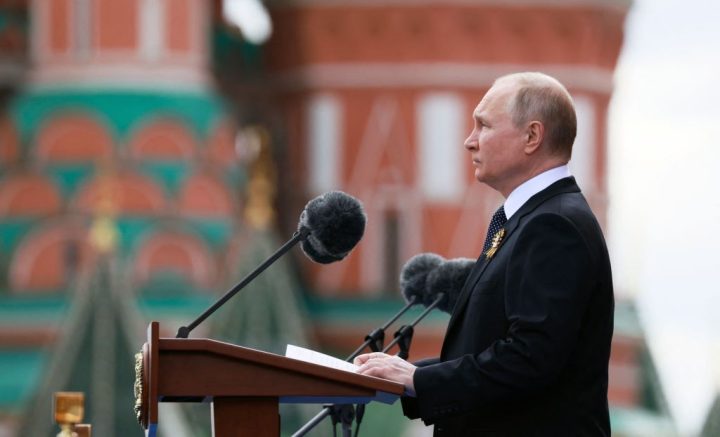In the Russian calendar 9 May holds near-religious significance. Celebrating the Soviet victory over Nazi Germany at the end of the Second World War, the occasion is considered Russia’s biggest patriotic celebration of the year.
Last year, following the invasion of Ukraine, the holiday took on a jingoistic significance for the Kremlin as Putin stoked up nationalist fervour to legitimise his war. This year’s celebrations, however, are shaping up to be a muted affair. More than 20 cities across Russia have cancelled their Victory Day parades. Marches of the ‘Immortal Regiment’, during which ordinary people parade through the streets carrying portraits of relatives who served and died during the war, as well as in the Afghan and Chechen wars, have been moved online. For now, despite an alleged drone attack on the Kremlin on 3 May, the one in Moscow is still scheduled to go ahead tomorrow. But outside the capital, the celebrations are being scaled back.
Whoever was to blame, the Kremlin drone attack provides convenient justification for scaling back tomorrow’s celebrations
The Kremlin has suggested heightened security concerns are to blame. Over the past few months, several instances of suspicious drone activity have been reported in the vicinity of Moscow, including one incident that forced the temporary closure of Vnukovo airport on the outskirts of the city.
Since the beginning of the year, an increasing number of acts of sabotage, allegedly with the help of drones, have taken place across Russia and Ukrainian territory it has occupied. Last Saturday, a huge arson attack on a fuel depot in Crimea was, the Russians said, carried out using a drone. While the Russians have claimed the drones in these instances are Ukrainian ones, scoping out strategic Russian targets, who truly is behind them – and what their motivations are – has been difficult to independently verify. Whoever was to blame, the drone attack on the Kremlin provides convenient justification for scaling back tomorrow’s celebrations. However, even before this incident, there have been signs that the Kremlin had been steadily tightening security around the big day.
On 27 April, Red Square, the focal point of Moscow’s Victory Day parade, was closed for the ten days leading up to the celebration ‘in connection with the preparation and holding of solemn events’. Such a move was highly unusual: in the 77 years that the event has been held, the square has only been shut in advance a handful of times, and never for so long. Last year, it was closed for a week ahead of 9 May, while the only other times it has been sht off in recent memory was for several days in both 2018 and 2019.
Might there be another reason, other than security fears, for scaling back the celebrations? Reducing and cancelling Victory Day processions across the country could conveniently save Putin from certain embarrassment: the sight of relatives taking part in Immortal Regiments carrying the photographs of relatives killed in Ukraine would be humiliating, not least because the Kremlin refuses to acknowledge the scale of Russia’s losses.
The last figure it gave for deaths in Ukraine was just under 6,000 in September 2022; by some estimates the true numbers stand at approximately 30 times more than that, at 180,000 casualties, if not higher. Moving the Immortal Regiments online makes it easier for Putin to avoid the uncomfortable truth about the reality of the war he has dragged Russia into and the difficult questions they would expose him to.
Another key part of the Victory Day parade is the procession of serving military personnel, weapons and military equipment into Red Square. With reports that Russia is struggling to replenish its stockpile of weapons used in Ukraine, some experts have speculated that in toning down the celebrations on 9 May, the Kremlin is trying to avoid drawing attention to the amount of military equipment they have lost on the front line.
Whatever the truth about why he has scaled back the festivities, Putin never misses an opportunity for repression.
Last week, reports have emerged of FSB officers searching the homes of the few prominent anti-Kremlin activists still living in Moscow. One such activist, Alexei Minyailo, claimed that the FSB raided his flat in the early hours of 3 May, ostensibly in connection with the murder of the pro-Kremlin military blogger Vladlen Tatarsky in St Petersburg last month. During the raid, one officer allegedly said to him that ‘before 9 May they were paying everyone associated with the FBK [Alexei Navalny’s Anti-Corruption Foundation] a visit’.
The FSB reportedly also recently paid a visit to the home of another well-known activist, Alexandr Kazitsyn, on the same day. After confiscating his phone and laptop, the security services detained him for 15 days. These men almost pose no credible threat towards the Kremlin. But such heavy-handed treatment towards them serves to stoke fear amongst Russians who might otherwise be considering some form of protest at celebrations tomorrow. In conjuring up a sense of paranoia, it also makes the state look proactive in trying to combat this ‘terror threat’.
Following Wednesday’s drone attack on the Kremlin, which the Russian government has slammed as an ‘assassination attempt’ on Putin, spokesperson Dmitry Peskov confirmed that the Russian president still planned to attend Moscow’s Victory Day celebrations and give a speech. He also confirmed that security would be ramped up further in preparation.
Victory Day in Russia is usually a bombastic, proud and nationalistic celebration. In the face of an excruciating war in Ukraine that seems far from ending any time soon, much has changed since last year’s jingoistic event.







Comments